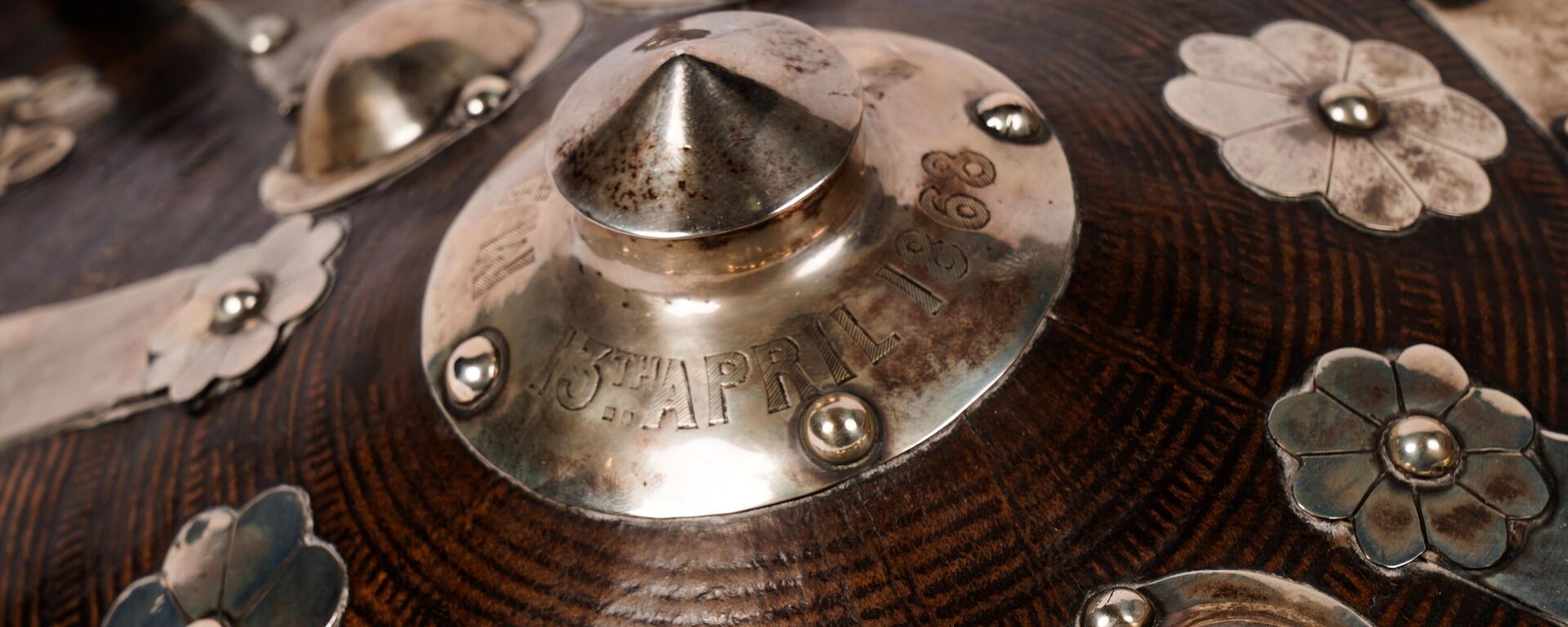https://en.sputniknews.africa/20240430/quite-a-shocker-british-auction-house-offers-18-human-skulls-from-ancient-egypt-1066306551.html
'Quite a Shocker': British Auction House Offers 18 Human Skulls From Ancient Egypt
'Quite a Shocker': British Auction House Offers 18 Human Skulls From Ancient Egypt
Sputnik Africa
The skulls come from the collections of Augustus Henry Lane Fox Pitt Rivers, a 19th-century British general who collected an extremely wide range of artifacts... 30.04.2024, Sputnik Africa
2024-04-30T18:45+0200
2024-04-30T18:45+0200
2024-04-30T18:51+0200
united kingdom (uk)
egypt
north africa
international
artifact
culture
history
united states (us)
archeology
ancient egypt
https://cdn1.img.sputniknews.africa/img/07e8/04/1e/1066308045_0:4:629:358_1920x0_80_0_0_58aa46d9fdcc4908a22df3b4c2124d33.png
The Saleroom, a British auction house, has 18 human skulls from Ancient Egypt up for sale, according to the auction website.The skulls of ten men, five women and three people of undetermined sex are for sale with a guide price of £200-£300, or about $250-$380.Several skulls are more than 3,000 years old and date from 1550-1292 BC, brought from Thebes.Such a sale has drawn criticism from some experts, who have called for a review of laws governing the sale of human remains.For example, Dan Hicks, a British museum specialist, told the US media that "it's quite a shocker" to see the skulls for sale.Laura Van Broekhoven, the director of the Pitt Rivers Museum, reportedly said that she was "really surprised that auction houses are still doing this."In early April, the British Museum was in the spotlight as an investigation was launched against it by the Information Commissioner's Office (UK's information watchdog) over allegations of excessive secrecy regarding a collection of sacred Ethiopian altar tablets that had been hidden from public access at the museum for more than 150 years.The 11 wooden and stone tablets, which were stolen by British soldiers after the Battle of Maqdala in 1868, have never been on public display and are considered highly sacred.
https://en.sputniknews.africa/20240229/victory-in-new-battle-stolen-ethiopian-shield-removed-from-uk-auction-after-african-govts-request-1065326112.html
united kingdom (uk)
egypt
north africa
united states (us)
ancient egypt
Sputnik Africa
feedback@sputniknews.com
+74956456601
MIA „Rossiya Segodnya“
2024
Maxim Grishenkin
https://cdn1.img.sputniknews.africa/img/07e7/0a/17/1063018107_0:0:1104:1103_100x100_80_0_0_03090c85a11f5d2e8a19cf1d989443c9.jpg
Maxim Grishenkin
https://cdn1.img.sputniknews.africa/img/07e7/0a/17/1063018107_0:0:1104:1103_100x100_80_0_0_03090c85a11f5d2e8a19cf1d989443c9.jpg
News
en_EN
Sputnik Africa
feedback@sputniknews.com
+74956456601
MIA „Rossiya Segodnya“
Sputnik Africa
feedback@sputniknews.com
+74956456601
MIA „Rossiya Segodnya“
Maxim Grishenkin
https://cdn1.img.sputniknews.africa/img/07e7/0a/17/1063018107_0:0:1104:1103_100x100_80_0_0_03090c85a11f5d2e8a19cf1d989443c9.jpg
united kingdom (uk), egypt, north africa, international, artifact, culture, history, united states (us), archeology, ancient egypt
united kingdom (uk), egypt, north africa, international, artifact, culture, history, united states (us), archeology, ancient egypt
'Quite a Shocker': British Auction House Offers 18 Human Skulls From Ancient Egypt
18:45 30.04.2024 (Updated: 18:51 30.04.2024) The skulls come from the collections of Augustus Henry Lane Fox Pitt Rivers, a 19th-century British general who collected an extremely wide range of artifacts, from weapons to ceremonial objects and jewelry, as well as human remains.
The Saleroom, a British auction house, has 18 human skulls from Ancient Egypt up for sale, according to the auction website.
The skulls of ten men, five women and three people of undetermined sex
are for sale with a guide price of £200-£300, or about $250-$380.
Several skulls are more than 3,000 years old and date from 1550-1292 BC, brought from Thebes.
Such a sale has drawn criticism from some experts, who have called for a review of laws governing the sale of human remains.
For example, Dan Hicks, a British museum specialist, told the US media that "it's quite a shocker" to see the skulls for sale.
"Every generation or so, surely we need to check in on our ethical compass on these questions and just ask, is this really right?" he said.
Laura Van Broekhoven, the director of the Pitt Rivers Museum, reportedly said that she was "really surprised that auction houses are still doing this."
"I would hope that we would stop selling and commodifying human remains of communities that really have tried to have dignified ways of, and usually ritual ways, of dealing with their ancestors," she said.
In early April, the British Museum
was in the spotlight as an investigation was launched against it by the Information Commissioner's Office (UK's information watchdog) over allegations of excessive secrecy regarding a collection of sacred Ethiopian altar tablets that had been hidden from public access at the museum for more than 150 years.
The 11 wooden and stone tablets, which were stolen by British soldiers after the Battle of Maqdala in 1868, have never been on public display and are considered highly sacred.



